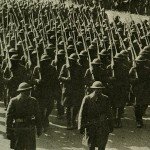I’m a white guy raised in a black neighborhood… Let’s start there.
Featured — By TFitz on December 17, 2009 at 10:28 amPlease allow me to introduce myself…
My name is Tom Fitzsimmons and I have a rather unusual background for a white guy. I was born in Alabama in 1957 but raised entirely in Los Angeles in a neighborhood that became, by the time I was 10 or 11 years old, what can only be described as a ghetto. Those were my years of living dangerously. My adolescent days were marked by fear and the numbing drone of everyday ghetto life. Going from point-A to point-B became an exercise in guerilla strategy. The specter of violence or a violent death even, was an everyday reality.
There were positives, big ones, but the reality of living on my toes, ready to run at the whiff of danger, mostly clouded over the positive experiences. This and all of the trips to the ER for stitches, living with the effects of numerous concussions, and a home life that offered no real refuge left me with, shall we say, issues. I should have been a bigot.
 Hell, I earned it (you think 40 acres and a mule was a good idea? Fine. I’ll take 5 acres and maybe a large dog) Am I a bigot? Probably not but we’ll have lots of time to figure that one out. Suffice it to say that my early years were a complex mix that a paragraph or two won’t make a dent. It’s probably better to string the autobiographical stuff out as the need arises. That brings me to the first idea I’d like to share with you.
Hell, I earned it (you think 40 acres and a mule was a good idea? Fine. I’ll take 5 acres and maybe a large dog) Am I a bigot? Probably not but we’ll have lots of time to figure that one out. Suffice it to say that my early years were a complex mix that a paragraph or two won’t make a dent. It’s probably better to string the autobiographical stuff out as the need arises. That brings me to the first idea I’d like to share with you.
Situational Prejudice or Sympathy for the Bigot
This is a concept I hit upon long ago. I’m sure others have too, but this is talked about so rarely that we’d probably never have heard it expressed. I’m a white guy who likes Black people and Black culture (look, African American is too long and AA is for meetings. If anyone has a better idea I’m listening) and I often find myself in the company of very bigoted people. We all do. But if we listen closely to them we see differences in the level and genesis of their prejudice.
By Situational Prejudice, I refer too is a fear/hatred that is caused by a limited situation such as military service, jail or prison time or, like me, the ghetto white boy experience (well, all three apply to me but enough bio for the moment). Why bother with the assignation Situational Prejudice? Because it’s different than the dyed-in-the-wool bigotry that comes from being raised perhaps by bigoted parents in lousy, often violent, home situations. Often that kind of person is a bully to everyone as well. Some people also just seem to be born mean.
Lions and Tigers and Bears
We are primates. We evolved from ancestors who were very social and also very much prey as well as hunter. One of those guys would have learned very early in life that lions, let’s say, are dangerous. There may have been some that were not as dangerous but it would not be a good strategy to try to discriminate among them. He would have known to avoid all lions (and also very likely members of his own kind that were not a part of his family clan) and that would be reinforced by his cultural environment also, probably in art and song. I’ll bet they even told lion jokes. In this case prejudice and bigotry were attributes and the ones that didn’t possess them probably didn’t live long enough to make babies. So here we have prejudice engendered by known danger and experience. This is fine as far as that goes but of course we live in a very different world these days. The problem is that we do so with pretty much the same brains as our ancestors who were equipped solely to deal with life on the African savannah.
Situational Prejudice can be cured
Instead of making up a hypothetical situation, let me delve into my own biography again by introducing an old friend of mine, Dicky Dixon. That’s his real name, by the way. I’ve been looking for him for years and I hope this mention might cause him to turn up. He goes by Joe now. Dicky was the first Black kid to move into the neighborhood when we were both 8 years old. He was my best friend and in the heat of the angry decade of the 70s’ when my life was at its’ worst due in large part to many of the Black people in my neighborhood, our relationship never wavered. He was really dealing with the same issues I was, just minus the intense racial hatred that was directed towards me. He had a very tough time with it.
The gangs we are so familiar with these days were nascent (I actually got along with some of the gang guys back then) and anger was the fashion. The problem with that is that Dicky was never an angry person. He was very thoughtful and introspective. Shy too. This put tremendous pressure on him and the toll it took was evident to me just by looking at him.
The last time I saw him was a couple of years after his family had moved from the neighborhood and we were maybe 18 years old. He made happy talk about his new friends but I had the strong feeling that he had made a lot of compromises to fit in. He appeared to be going through a bit of a breakdown. He was saying goodbye. Maybe not directly so, but it had all of the markings of a farewell. He expressed hope that someday all of this crap would die down and we could be like we were when we were kids. He said he didn’t know when he’d be back. There were tears at that point from someone. I think it was him. It was the last time I saw him.
In my mind now, I see him in the alley leaning against his car with the L.A. sunset as a backdrop (it’s a beautiful thing that sunset, but it lies).
How does this fit into the Situational Prejudice thing? In later years, I found myself stuck in situations where there were angry Black people who meant to do me harm, I’d think of Dicky. When I was feeling perhaps the need to condemn the whole damn race I’d think of Dicky in the alley with the sun setting and both of us trying to keep from crying. Powerful medicine… Very powerful.
It becomes very easy for Black people, given the horrid history of the way they have been treated in this country, to discount people who act as if they are your enemy. It’s easy to put them all under one definition and ignore the differences between them and the similarities even, to their own lives. Sometimes the things that white people are reacting to with racial prejudice are often the same things that they themselves will react to with a more refined set of prejudices. The subsets become the gangsters, people who act in a manner that is just too, too ghetto, and numerous other appellations.
Do all of the people that they are reacting to with their own prejudices deserve their condemnation? I know from my own experiences that they do not, that amongst the whores, the pimps and gangsters there are good people and also some very frightened children.
Here’s my point. Everybody has a Dicky Dixon in their lives to one extent or another and sometimes all that they need is to be reminded of that, to bring large angry issues into the smaller more relevant context of their own personal lives and stories. If you condemn an entire race of peoples, you are also condemning someone you loved. It works. Will this reminder cure all their ills? No, but it does go a long way towards a better life for them. It also probably takes one of ones own to apply it. Every situation of course is different.
You do this for someone and perhaps they will be in a situation where they will share this with someone else. Before long we have a better world, or at least a good Kevin Spacey movie. Actually, I think this is a better model than the one proposed in Pay It Forward. There’s more content to this than just simple acts of kindness. There’s more of an emotional impact.
This situational prejudice theory, of course, applies to all groups, all races and all cultures. It gets more complicated among those that are oppressed or at least perceive that they are oppressed. Their bigotry is often seen as a sort of birthright, an entitlement, perhaps even their obligation. It is too often seen as something to be cultivated and honored. Whether Dicky thought of me later in life when he had trouble with white people, I don’t know. Maybe he didn’t need to.
I do know though that situational prejudice without the cure applied will just fester and grow, always finding affirmation for itself until before too long it is indistinguishable from the simple, stupid and dull-eyed bigotry we talked about earlier and is just as much of a cancer to the heart and mind.
So, thanks for reading through to the end and I hope to see you back again. I encourage comments of course and I do monitor them and reply. This is a dialogue. My friends call me Fitz.
Tags: African American, African-Americans, bigot, blacks, race, racism, situational prejudice, Talking about Race


 Share This
Share This Tweet This
Tweet This Digg This
Digg This Save to delicious
Save to delicious Stumble it
Stumble it








 Global food crisis needs a new model
Global food crisis needs a new model Want health care reform? Seek bliss, and work together
Want health care reform? Seek bliss, and work together Black vets: complicated past, unsung present
Black vets: complicated past, unsung present Obama’s modest jobs proposal
Obama’s modest jobs proposal